Army Lt Nainoa Hoe ~ Farewell and Walk with God
Lt Nainoa Hoe

Saturday, January 29, 2005
Nainoa Hoe's Last Patrol
By Steve Fainaru Washington Post
MOSUL, Iraq — The 21-ton Stryker attack vehicles pulled into the neighborhood of al-Whada just after noon. Their rear ramps dropped simultaneously, disgorging dozens of American infantrymen into the cold rain.
The soldiers had multiple tasks on this day. In addition to hunting insurgents and searching houses, they were to help get out the vote for tomorrow's national elections. For the next three hours, soldiers armed with assault rifles and election fliers moved warily through al-Whada's muddy streets, trying to get Iraqis to embrace democracy.
The inherent danger of the mission was driven home at 3:30 p.m. A single shot rang out, and 1st Lt. Nainoa K. Hoe, 27, the popular leader of the 2nd Platoon, Company C, 3rd Battalion of the 21st Infantry Regiment, fell dead in the street.
"Treat him! Treat him!" screamed Staff Sgt. Steve Siglock, one of his closest friends.
The shot that killed Hoe last Saturday was followed within seconds by a blizzard of gunfire aimed at his exposed platoon. It was already too late for Hoe, but his men stepped directly into the gunfire in a desperate attempt to save him while fending off the unseen insurgents.
On the campaign trail in Iraq, U.S. troops are almost alone. Violence has kept away the election monitors, international peacekeepers and nongovernmental organizations that normally perform the basic tasks of electioneering in nascent democracies. With not even the candidates out on the streets, the role of getting out the vote has fallen to thousands of infantrymen like Hoe, soldiers who are menaced by the possibility of instant death.
"The one thing people got to understand here is you got to have two faces" in Iraq, said Sgt. 1st Class Corey Myers, who was Hoe's platoon sergeant. "One as a friend — as a helper — and one as a soldier. And you got to be able to switch faces in a second."
Election mission
The elections, more than any previous event, highlight how the U.S. military's role has changed since the March 2003 invasion. In this increasingly complex environment, infantrymen are called upon not only to fight a deadly insurgency but also to perform civil affairs missions and "information ops" normally the province of noncombat military units and nongovernmental organizations.
After a day of handing out election fliers in the driving rain, Hoe was cut down while escorting members of a military intelligence team to a medical clinic. The team wanted to know why the clinic had turned down free medical supplies.
"This is the mission at hand," said Lt. Col. Michael Gibler, the 3rd Battalion commander. The Army had lost one of its "future leaders," he said, adding: "I don't think I'm any more bitter about losing a young man for a CA (civil affairs) mission, or an election mission. The bottom line is we have to get it done. And the sooner we can get it done, we can all go home."
Hoe, a Kamehameha Schools graduate from Kailua, had taken command of the 41-man 2nd Platoon in April — two months before he was married and five months before his battalion, which is based at Fort Lewis, Wash., deployed to Iraq. The command was the fulfillment of a dream for Hoe, who after several years as an enlisted soldier enrolled at the University of Hawai'i so he could return as a commissioned infantry officer.
"We have a saying in the infantry: You have tab wearers and you have tab bearers," said Staff Sgt. Hank Moreno, 35, of Tempe, Ariz. "Lt. Hoe was a tab bearer. He was part of it, he was a part of us. He didn't just wear it."
Hoe quickly won over a skeptical platoon by mixing levelheaded decision-making with a playful sense of mischief, straddling the fine line between leader and friend, his soldiers said. He was an intellectual who one minute would debate the role of the Kurds in post-invasion Iraq and the next would launch surprise air pistol attacks on his men, who responded in kind. For a time, Hoe also served as the platoon barber.
A proud Hawaiian
A surfer and swimmer, Hoe was so proud of his Hawaiian ancestry "you could say he was a nationalist," Siglock said. Hoe's father, Allen, is a Vietnam veteran, and Hoe carried an American flag that his father had carried. His younger brother, Nakoa, is about to be deployed to Iraq as a member of 100th Battalion, 442nd Infantry. Hoe was proud of his family's military history but joked that Hawai'i had been better off without the Mainland.
"He would say, 'We don't have to be a state; we were fine without you, just fine,'" Siglock recalled.
The night before his death, Hoe stood by the campfire that the platoon lighted each night behind its barracks. He was especially happy, his men recalled. His driver, Spc. Enoch Thornton, had sold him a Black Hawk holster for $50. The holster matched Hoe's belt and resolved what he had called "a tactical fashion faux pas."
Hoe stood by the campfire with his men, a familiar grin on his face, quick-drawing his 9 mm pistol from the holster like a gunslinger.
Before missions, the military raises its level of readiness to Red Con 1. Hoe would call to his platoon, using its nickname: "Hey, Outlaws, get ready for Red Con Fun!"
The lighter side ...
Saturday's mission began as it always did, with Hoe imploring Thornton to sing a song by Tenacious D, one of Hoe's favorite bands.
"C'mon, sing a song, Thornton," Hoe said as they sat inside the hulking Stryker.
Thornton complied. The words to "Kyle Quit the Band" came over the platoon's intercom as Hoe sang along:
One minute ago Kyle quit the band
Now we're back together again
Misunderstanding didn't understand
Now we're back together again, la la la ...
The 1st and 2nd platoons of Charlie Company — more than 80 men packed into seven armored vehicles — then rolled out the gates of Camp Freedom. The platoons came to a stop at al-Whada in southeast Mosul, where since November insurgents have taken potshots at U.S. and Iraqi troops from mosques and vacant buildings.
The attacks have intensified with the approach of the elections, soldiers said.
The 1st Platoon worked the west side of the neighborhood, Hoe's 2nd Platoon the east.
The men bolted from their vehicles into the slanting rain, running and sweeping their black M-4 rifles from side to side. Behind them crept the dark green Strykers, their .50-caliber machine guns trained on the neighborhood
.
On a cinder-block wall, graffiti read: "Long Live Saddam, Father of All Martyrs."
On a cinder-block wall, graffiti read: "Long Live Saddam, Father of All Martyrs."
Aside from the troops, the streets were empty.
"The local population, they want to be hospitable, but a lot of times they're either nervous, just due to our very presence or due to the fact that as soon as we show up, several minutes later they're gonna start receiving mortar fire or RPG fire or small-arms fire near their homes" from insurgents, said the Charlie Company commander, Capt. Rob Born, 30, of Burke, Va.
Born stopped to chat up a butcher hacking up a cow in his carport.
"Are you gonna vote?" Born asked cheerfully.
He handed the man a red-and-white leaflet that showed two Iraqis casting ballots. "One vote is more precious than gold," the leaflet said.
"If it's safe to go, I will. If it's not, I won't," the butcher told him.
"Fair enough," said Born.
Push for votes
About 10 minutes later, Born stopped to talk with Hassan Jaffar Ali, a 20-year-old art student. He said he planned to vote and thanked Born, telling him: "If the Americans are here, there is safety. If they go, there is not."
Soldiers then surrounded a two-story house. The battalion had received reports that it was being used as a meeting place for insurgents.
A paunchy, middle-aged man invited the soldiers to search the house. As they did, the 1st Platoon leader, 2nd Lt. Jason Shick of Grand Rapids, Mich., questioned the man on the second floor.
"Ask him does he know any anti-American forces or anti-coalition forces at all in this area," Shick told the interpreter. "Tell him we're searching all the homes in the area, so he's not going to get singled out."
"We don't have anything to tell you," the man's wife said plaintively in halting English.
The man shook his head no.
Shick checked the man's name against a list of suspects. Satisfied he was not a terrorist, Shick then tried to lock up his vote.
"Is he going to vote in the upcoming elections?" he asked the interpreter.
"Yes, they are going to go vote," the interpreter said after consulting with the couple.
"Good. Tell him thank you very much," said Shick, heading back down the stairs. "And make sure he votes. If he votes, we leave. Americans go home."
Last-minute changes
The two platoons then gathered for the final phase of the mission.
The 1st Platoon was to escort two members of a tactical human intelligence team, or THT, to the medical clinic. The 2nd Platoon was to hand off an encryption device to U.S. advisers working with Iraqi troops near a hospital.
At the last minute, however, the orders changed. Hoe was ordered to escort the THT to the clinic.
"Nobody had a problem with it. It was just easier for us to transport the THT guys, so we swapped missions," Siglock recalled. In interviews, he and 15 other soldiers described the events that followed.
Hoe decided to pull up several hundred yards short of the clinic and take only one squad of nine soldiers to avoid frightening the clinic staff. When the men dismounted from the rear of the Stryker, however, the platoon was still a city block away, farther than Hoe had intended.
"Everyone remount," Hoe started to say, according to Thornton, who was still in the vehicle.
Then he decided against it. "Nah, (expletive) it, we'll walk."
Hoe joined the formation, the two-man intelligence team behind him. The soldiers began to walk toward the clinic on a street that ran along an open field. On the other side of the field, about 250 yards away, stood a mosque.
The shot rang out from a building near the mosque. Hoe was wearing a bulletproof vest, but the bullet hit him in the exposed crease behind his left shoulder. It traveled through both lungs and punctured his aorta before exiting his body through his right armpit.
He died almost instantly, doctors later concluded.
"Ow," Hoe seemed to say as he fell.
"In my opinion, it was an ambush initiated by a sniper," Siglock said. The sniper probably identified Hoe as the platoon leader by his proximity to his radio operator, Pfc. Jerome Roettgers, 23, of Cincinnati, who was trailing Hoe with a two-foot antenna.
'2-6 is down'
As Hoe lay in the street, Siglock relayed the unthinkable to Myers, the platoon sergeant: "2-7, this is 2-1, 2-6 is down."
Hoe's radio call sign was Tiger 2-6.
The message bludgeoned the platoon.
In the brief moment of shock, at least five insurgents opened up on them. The shots came from across the field; muzzle flashes were seen coming from the tall minaret of the mosque.
The platoon scrambled to return fire and rescue its leader. Roettgers was the first to reach Hoe, but the platoon leader "was waterlogged" from a day spent patrolling in the rain and standing in the Stryker's open hatch, he said. Roettgers could barely budge him.
Roettgers was joined by Pfc. Robert Layton, 23, of Buckley, Wash., and the two began to pull Hoe off the street. But they couldn't find cover. Both were bracing to be shot when Pfc. Darrin Gooding, 21, of Annapolis, Md., stepped directly between them and the insurgents and began firing back.
Gooding had been just a few feet from the Stryker when the ambush occurred. He could have taken cover behind it, but instead he moved into the fusillade to protect the three men.
"That was probably one of the most comforting sights I've ever seen in my life, reaching down for Lt. Hoe and as I look up, I see Gooding backing down on us, shells flying," Layton said.
The men got Hoe into an alley, which the platoon then sealed off with a Stryker. Myers and the platoon medic, Spc. Rusty "Doc" Mauney, took over. Mauney gave Hoe two quick "rescue breaths" and took his pulse. Hoe had none.
Mauney thought he might have missed it because of the noise from the gunfire, but the firing stopped and Hoe's condition was the same.
Desperate cries
Hoe was dead, but his men refused to believe it
.
They loaded him into the Stryker and drove to the combat support hospital about seven miles away. The 21-ton trucks raced 60 mph through the streets of Mosul, fishtailing around corners, air horns blasting.
They loaded him into the Stryker and drove to the combat support hospital about seven miles away. The 21-ton trucks raced 60 mph through the streets of Mosul, fishtailing around corners, air horns blasting.
Inside the lead vehicle, Mauney frantically performed chest compressions while Myers gave Hoe mouth-to-mouth.
"I was covered in his blood," Myers recalled somberly. "We were doing the compressions, and every time there would be something coming out of something and hitting me in the face. There was swelling in his chest area; the blood was pooling up in his chest. We turned him on
his side to get the fluid out of his lungs, like you'd do when somebody is drowning. A large volume of blood came out at that point."
"Don't give up!" Myers shouted at Hoe. "Don't you (expletive) quit on me!"
Mauney and Myers helped carry Hoe into the emergency room. A doctor walked over to Myers to see if he too had been wounded. When the doctor learned that Myers was covered in Hoe's blood, he took out a white rag and tenderly wiped off his face, "like I was some kid who had candy all over him," Myers said.
The rest of the platoon gathered in a dirt parking lot that had turned into a swamp. The men were soaked. It was still raining, but no one sat inside the Strykers. Nearly everyone was smoking; they burned the cigarettes to the butt and then used them to light more.
Dreaded words
Mauney was still in the operating room when the chief surgeon shook his head and announced, "Time of death: 1602."
Mauney walked outside and smoked. A doctor came out and handed him Hoe's soaked pistol belt. The medic kept thinking about the previous summer. Hoe had been hit by a car while jogging, and Mauney went to his house every day to change his dressing.
"Hey, Doc, I never saw a medic who makes house calls," Hoe's new wife, Emily, teased him.
Then she said: "Well, I don't have to worry about him over there with you looking out for him, do I?"
"I was just sitting out there in the rain, holding his pistol belt, and that was going over and over in my mind," Mauney said.
By then, Gibler, the battalion commander, had arrived. He wanted to break the news to the platoon, but Myers insisted that he be the one to do it.
Gibler, Myers and Born, the company commander, walked out into the rain. The platoon was gathered around the Strykers. Some of the soldiers already knew. Some knew but didn't want to believe it.
"Nainoa didn't make it,"
Myers told them.
The men were crying now, all 40 of them. Born started to speak. "I know how close you all are. ..." He broke down and turned away.
Myers announced that anyone who wanted to could come inside the hospital and pay their last respects.
At first, no one moved. Then slowly the soldiers shuffled forward.
Hoe rested on a gurney in a remote hallway. He was covered by a blanket except for his face.
His men walked slowly around the gurney until they had nearly formed a circle. Then the entire platoon, all 40 men, knelt beside their platoon leader and prayed.
The men rose and moved on. Some reached out and stroked Hoe's cheek. Some leaned over and whispered into his ear.
"Vaya con Dios," said Moreno.
Siglock recalled that Hoe had once told him that if he could surf every day for the rest of his life, he would. Now, sobbing, Siglock told Hoe: "You caught your wave."
Roettgers, who slept on the bunk above Hoe's and was with him more than anyone, looked at the platoon leader and smiled. Hoe's eyes were halfway open.
"That's the way he sleeps," Roettgers said.
*********************
To read more about Lt Nainoa Hoe
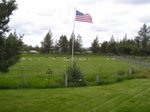


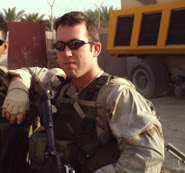










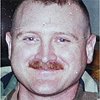


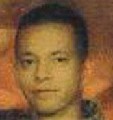









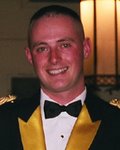






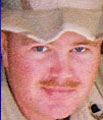
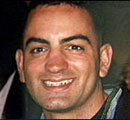




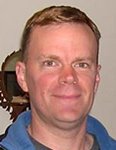
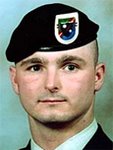




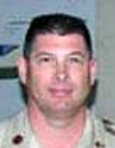
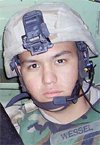
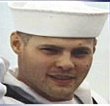
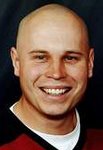
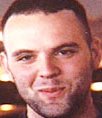
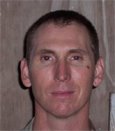

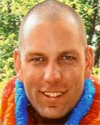
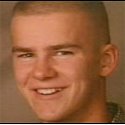
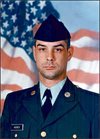


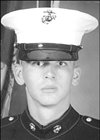
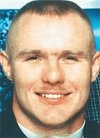
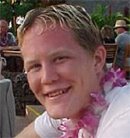

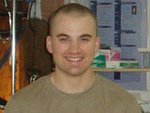

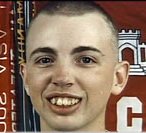


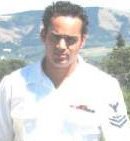

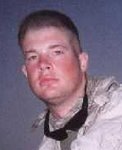
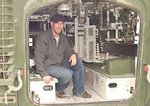
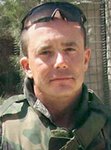

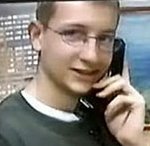

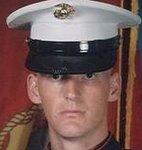
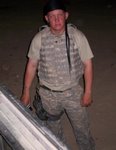
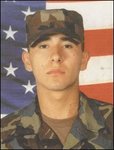
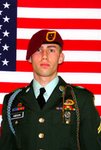

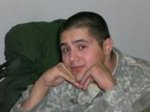
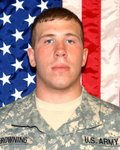





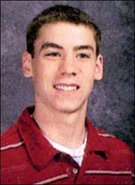
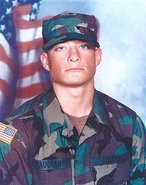
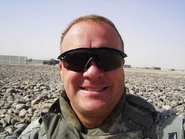
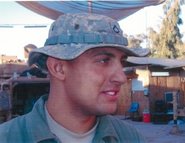
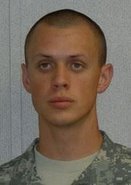
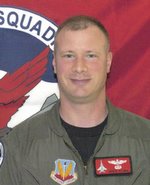
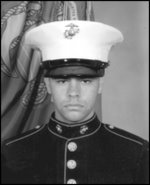
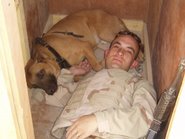
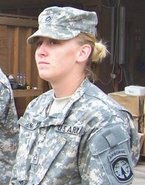
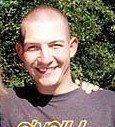
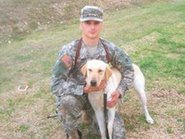

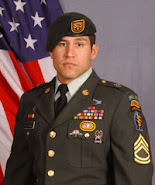

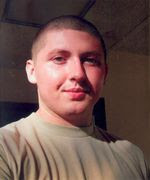



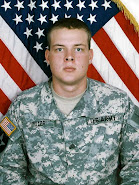
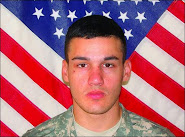



7 comments:
I read this at work. I had to stop, because the end caused me to tear up. Sometimes I can be overly emotional. Lt Hoe sounds like a great man and a great leader. It is always hard to see one of the good ones go. keep up the good work on your blog.
Thanks for sharing this tender story. He was a great leader and he led wonderful men. God be with each of them and their families.
His death was a harsh blow to this unit. Thank you for reading the story of his life.
Thank you for posting the story of Nainoa and his men. My son was there that day. I'm sure you can tell from the story, but Nainoa was really loved and respected by his men. Even 3 years later they still think of him. Some of the men in this story are back in Iraq today. They consider it an honor to serve the country to which Nainoa gave "the last full measure of devotion". I don't know much about blogging, so I'll publish this comment anonymously...hope that's ok.
Thank you for sharing your story.
We are grateful for such wonderful men as Nainoa and his men. We wish them well - snd they will be in our prayers during their deployment.
I am Darrin Goodings Brother.
Thank you for posting this powerful story about Lt. Hoe. My Brother could not ask for a better leader.
He was perhaps the epitome of what an American soldier should be.
I had the absolute honor of meeting Lt. Hoe's father, Allen. Men like him are the reason I gladly wake up and do my job. On this Memorial Day, please pause and remember great men like Lt. Hoe, Doc HM3 Mark Cannon, they gave their best for what we have.
S/F
Stephen Mercer
SGT/USMC
Post a Comment